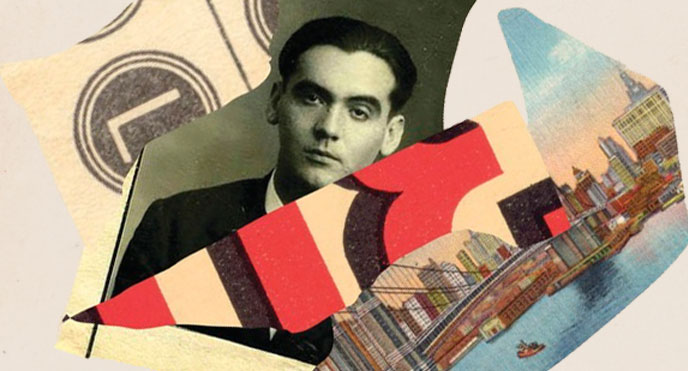In this poem, from Federico Garcia Lorca’s wonderful, evocative book, Poet in New York, the shifting connotations of words—horse, dog, swallow, bee—lead us through the stages of artistic creation, from painful physical desire to the bittersweet perception of beauty (the rose), to the isolation and the glory that comes from the search for beauty, and finally to the acceptance of the body that this search ends with—invoked in the burning angel. This is a poem about death, which means (to me, at least) it’s a poem about life, about a process—painful and beautiful, full of paradox, even within the poetic line—that ends, finally, hopefully, in pure exultation. Garcia Lorca, like all the great poets, swings a sensitive antenna across the emotional miasma of existence, picking up signals that are, one way or another, available only through the unique perceptions, the music, of the individual soul.
—David Means
Death
To Isidoro de Blas
How hard they try!
How hard the horse tries
to become a dog.
How hard the dog tries to become a swallow.
How hard the swallow tries to become a bee.
How hard the bee tries to become a horse.
And the horse,
what a sharp arrow it squeezes from the rose,
what an ashen rose rising from its lips!
And the rose,
what a flock of lights and cries
knotted in the living sugar of its trunk.
And the sugar,
what daggers it dreams in its vigils!
And these miniature daggers,
what a moon without stables, what naked flesh,
undying and rosy skin they seek out!
And I, on the roof’s edge,
what a burning angel I look for and am.
But the plaster arch,
how vast, how invisible, how minute,
without even trying!
Muerte
A Isidoro de Blas
Qué esfuerzo,
qué esfuerzo del caballo
por ser perro,
qué esfuerzo del perro por ser golondrina,
qué esfuerzo de la golondrina por ser abeja,
qué esfuerzo de la abeja por ser caballo.
Y el caballo,
¡qué flecha aguda exprime de la rosa!,
¡qué rosa gris levanta de su belfo!
Y la rosa,
qué rebaño de luces y alaridos
ata en el vivo azúcar de su tronco;
y el azucar,
¡qué puñalitos sueña en su vigilia!;
y los puñales diminutos,
¡qué luna sin establos!, ¡qué desnudos!,
piel eterna y rubor, andan buscando.
Y yo, por los aleros,
qué serafín de llamos busco y soy.
Pero el arco de yeso,
¡qué grande, qué invisible, qué diminuto!,
sin esfuerzo.
Federico García Lorca, one of Spain’s greatest poets and dramatists, was born in a village near Granada in 1898 and was murdered in 1936, at the beginning of the Spanish Civil War.
David Means was born and raised in Michigan. He is the author of four collections of stories, including The Spot, Assorted Fire Events, which won the Los Angeles Times Book Prize for fiction, and The Secret Goldfish, which was short-listed for the Frank O’Connor International Short Story Prize. His work has appeared in The New Yorker, Harper’s Magazine, Zoetrope, The Best American Short Stories, The O. Henry Prize Stories, and numerous other publications. He lives in Nyack, New York, and teaches at Vassar College.
Read all of our Poetry Month coverage here

